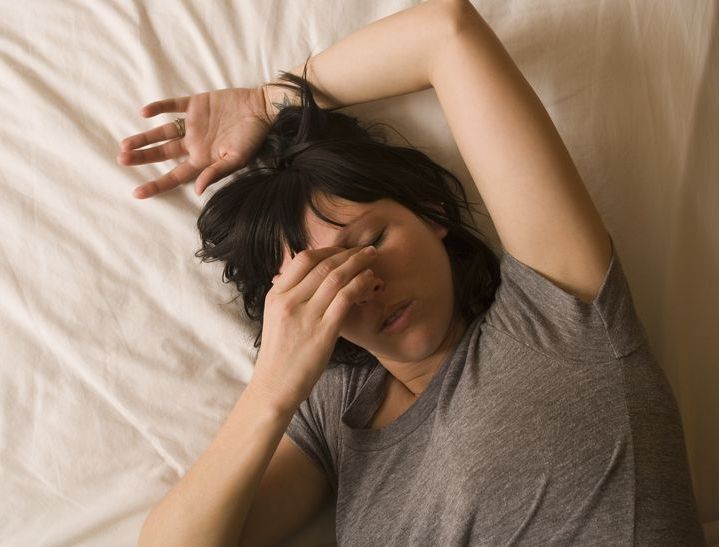So, periods stink: You’ve got PMS, agonizing cramps and body aches, bloating, cravings, and, of course, bleeding. Can it get worse? Well, you may also deal with a lovely aching, throbbing headache before or during your period. UGH.
Yep, it’s not just you—the period headache is real. “Indeed, many women do suffer from the fancy diagnosis of ‘premenstrual migraines,’” says Mary Jane Minkin, MD, a board-certified ob-gyn and clinical professor of obstetrics, gynecology, and reproductive sciences at Yale School of Medicine.
“It is very difficult to tell if a migraine is hormonally related or not just from the symptoms, but it’s the timing that’s the usual clue,” Dr. Minkin says. “Many women get these headaches the day before or so and the first day of their period.”

Some good news? By day two or three of menstruation, period headaches *usually* fade, Dr. Minkin says. But until then (and for next month!), it helps to know how to tell if it’s period-related head pain you’re dealing with—and how to ease your discomfort.
Here, everything you need to know about premenstrual headaches from a couple of period pros.
Why do some women get period headaches?
Blame estrogen, says Sheeva Talebian, MD, a board-certified reproductive endocrinologist at CCRM in New York and a Women’s Health advisory board member. “Most menstrual-related headaches are due to the rapid drop in estrogen right before the onset of your period,” she says.
A mini menstruation lesson: When you ovulate (as in, an egg is released from your ovary), your estrogen peaks and your ovary makes progesterone. For a while, your womanly hormones stay up. But if you’re *not* pumping pregnancy hormones a week or so later, your body halts estrogen and progesterone production, triggering your period, Dr. Talebian explains.

That sudden drop in estrogen (a.k.a. “estrogen withdrawal”) tweaks chemicals in your brain that affect how you experience pain, and up goes your sensitivity, the U.S. Department of Health & Human Services’ Office on Women’s Health (OWH) explains. Add to that constricted blood vessels, which happens to some women when they’re low in estrogen, et voilà: the dreaded period headache.
Other potential factors that can play into period headaches? Dehydration, blood loss (especially if you’re anemic), and poor sleep, Dr. Talebian notes. Already prone to migraines? Then there’s a 60 percent chance you’ll suffer from menstrual migraines as well, per the National Headache Foundation (NHF). And if you’re on birth control, that can bring on more headaches when you switch to your sugar pills and your estrogen levels tank (yay, hormones!).
Does this feel like your typical headache or…?
They may present a little differently than a typical headache or migraine. Menstrual headaches can range from mild to severe when it comes to pain, says Dr. Talebian, and they tend to start on one side of your head before spreading (docs aren’t sure why this is, she says).
Classic migraine symptoms could strike, too; for instance, you might feel super-sensitive to light and sick to your stomach.
Okay, gimme the fix: How do I get rid of mine?
The first step is prevention. Stay hydrated, get some rest, and make sure you’re logging enough hours of sleep. If you know a headache tends to come with your period, try using a period tracker and then start taking over-the-counter pain meds like aspirin, ibuprofen (Advil or Motrin), or naproxen (Aleve) a few days before, Dr. Talebian suggests. These meds will help fight the inflammation causing that pounding in your head. Take ‘em as needed with food (to avoid upsetting your stomach and developing ulcers), and follow the recommended dosage on the back of the box.
If you’re on the Pill, you may be able to prevent your headaches by simply taking pills through your period and skipping the sugar pills to keep estrogen levels up. But always consult with your doctor first before making any changes to your medication regimen.
Got pain or killer nausea on top of a headache? It’s best to see your MD. You may need prescription meds to treat more severe migraine symptoms.
Another option if you’re really struggling with menstrual migraines: Ask your doctor about a script for an estradiol pill, suggests Dr. Minkin. Simply put, it’s like a boost of estrogen that you put under your tongue and can give you sweet relief in as little as 30 minutes, as estrogen is absorbed right into your bloodstream, she explains. “It’s truly amazing.”
Source: Read Full Article
